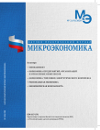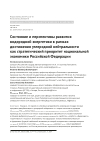The state and prospects of hydrogen energy development within the framework of achieving carbon neutrality as a strategic priority of the national economy of the Russian Federation
DOI: 10.33917/mic-6.119.2024.18-30
It is shown that the hydrogen economy is considered one of the key directions in the implementation of state decarbonization and carbon neutrality programs today. The technological and organizational and economic aspects of the production of environmentally friendly types of hydrogen are considered, depending on the method of production and the volume of carbon dioxide emissions, namely «green», «yellow», «blue», «turquoise», «brown» and «gray». It has been established that hydrogen technologies are the basis in the foundation of the future global economy, in which environmental protection issues come first, and as a result, the use of hydrogen will become a new driver of development.
It is shown that Russia has a huge potential for hydrogen production and export on a global scale. Therefore, hydrogen technologies are not only talked about in a positive way both at the largest Russian forums, but also as part of the discussion of innovative strategies of the largest Russian companies, but also move on to the practical implementation of a number of government programs and national projects.
References:
1. Borisova E.A. The development of hydrogen energy in the East. In the book: Economic, socio-political and ethno-confessional problems of Afro-Asian countrie, 2020. pp. 36–38.
2. Velikorossov.V., Genkin E.V., Filin S.A. The use of hydrogen energy to increase energy security and Gez transformation. National interests: priorities and security. 2023;19(8 (425)):1587–1600.
3. Volkov A.R., Makarenko E.D., Kim A.A. Hydrogen production from waste as a promising auxiliary vector for the development of hydrogen energy in the world. In the collection: Almanac of scientific works of young scientists of ITMO University. St. Petersburg, 2023. pp. 267–269.
4. Lebedkov R.K., Goryachev S.V. Hydrogen and alternative energy: past, present and future. Internauka. 2022;(13-3 (236)):18–20.
5. Plotnikov V.V., Aldoshina N.D. Hydrogen energy. Bulletin of scientific conferences. 2021;(4-3 (68)): 90–91.
6. Saitova A.A., Ilyinsky A.A., Dzhemilev E.R. Prospects for the development of hydrogen energy in the Russian Federation. Bulletin of the Perm University. Series: Economics. 2023;18(4):423–444.
7. Sokolov A.S. Hydrogen energy: the beginning of a long journey. In the book: Lomonosov readings. The history and modernity of physics (ISOF-2020), 2020. p. 70.
8. Chopanov D.A. Hydrogen energy as the future of the energy industry and renewable energy sources. Internauka. 2022;(15-3 (238)):44–45.
9. Shevandronov N.A., Brostilova T.Yu., Brostilov S.A. Application of hydrogen energy in transport and small-scale energy facilities. Proceedings of the international symposium «Reliability and Quality». 2024. Vol. 2. pp. 140–142.
10. Amir F.A. The world hydrogen economy: opportunities and difficulties of use. In the collection: Russian regions in the focus of change. Yekaterinburg, 2023. pp. 703–708.
11. Atia N., Pandey M., Sen M., Saxena S. Factors influencing the economy of environmentally friendly hydrogen production in the interests of sustainable development, and related problems. Environmental science and pollution research. 2024;31(32):44542–44574.
12. Bonafé E., Conte M., Bouchard K. Hydrogen Valleys: an assessment of the EU’s legal and financial framework for the development of the hydrogen economy. Global energy legislation and sustainable development. 2023;4(1-2):96–114.
13. Cao Yu., Huang Yu., Liu R., Zhuo Yu., Liu P., Ne J. Optimization of the performance of a multi-energy complementary microgrid, taking into account an environmentally friendly hydrogen system. In the materials: 2021, the 4th International Conference on Energy, Electrical Engineering and Power Engineering. CEEPE, 2021. vol.4. pp. 765–769.
14. Demin S.A. Prospects of Russian-German cooperation in the field of hydrogen energy. In the collection: Topical issues of regional and international studies. Novosibirsk, 2021. pp. 34–36.
15. Egorov A.N., Yurin V.E., Bayramov A.N. Technical and economic optimization of hydrogen-thermal energy storage at a nuclear power plant. In materials: IOP Conference Series: Earth and Environmental Science. 2022. p. 012065.
16. Feuer J., Proust C., Proust M. An example illustrating the role of research and development in the emerging industrial hydrogen economy. Web conference MATEC, 2023. No. 379. p. 07001.
17. Kumar R., Bhaumik, Mahesh Galrani R., Xavier Francis A., Dhawan H. Optimization of the efficiency of hydrogen fuel cells for the next generation of energy supply. Materials today: Proceedings, 2023.
18. Mittal H., Kushvakha O.S. A roadmap for policy implementation, various prospects, problems and solutions on the way to a low-carbon hydrogen economy. A green and low-carbon economy, 2024.
19. Mokshitsky E., Gavlik L. The development of a green hydrogen economy: an overview. Energy. 2024;17(13):3165.
20. Ceo D.S. A study devoted to the development of an intelligent mobile platform for an economically accessible society of the hydrogen economy. Journal of Convergence Consulting Research. 2022;2(3):1–8.
21. Sharma N., Lemar P., Nimbalkar S. Hydrogen bonding of wastewater (WWHEN): greening the wastewater treatment industry through integration with the hydrogen economy. Energy and climate change. 2024;5:100145.
22. Singh R.N. The influence of hydrogen embrittlement on the hydrogen economy. Procedia Structural Integrity. 2024;60:411–417.
23. Wang J., Kang L., Liu Yu. Optimal design of electro-hydrogen energy storage systems for the use of renewable energy sources in chemical process systems. Journal of Chemical Industry and Engineering. 2020;71(3):1131–1142.
24. Wolfram P., Kyle P., Furman J.A., O’Rourke P., McJohn H. The hydrogen economy can reduce the cost of mitigating climate change by up to 22%. United Land. 2024;7(5):885–895.
25. Zare Oskway M., Mohammadi-Ivatlu B., Erdinch O., Gulshen Erdinch F. Multi-purpose operation of an integrated hydrogen-based renewable energy distribution network with limited risk. International Journal of Energy Research. 2022;46(10):14462–14477.



